September 24, 2021
Air Date: September 24, 2021
FULL SHOW
SEGMENTS
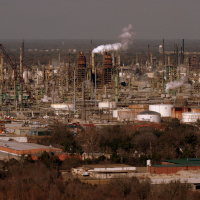
Big Oil Under Fire for Climate Disinformation
View the page for this story
The US House Oversight and Reform Committee has summoned top executives from Exxon, Shell, BP and Chevron and two affiliated lobbying groups to testify in front of a committee hearing in October, as part of its ongoing investigation into the fossil fuel industry's promotion of climate disinformation. Kert Davies, founder and director of Climate Investigations Center, joins Host Steve Curwood to discuss the investigation. (10:01)
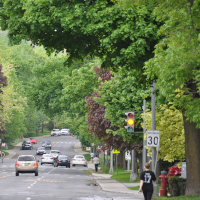
Beyond the Headlines
/ Peter DykstraView the page for this story
This week, Environmental Health News Editor Peter Dykstra fills in Host Steve Curwood on the link between household income and tree cover. Also, how wildfires in Australia led to a giant algal bloom thousands of miles away in the Pacific Ocean. In the history calendar, they look back to the Montréal Vaccine Riot of 1885, when antivaccine sentiment turned violent in the face of a smallpox epidemic. (04:07)
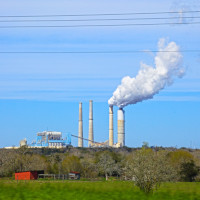
“They Knew”: The Feds’ 50-Year Climate Failure
View the page for this story
For the past 50 years, the US government has known about the problem of climate change but has continued to promote fossil fuel development and done little to avert a crisis. Environmental lawyer and leader James Gustave (“Gus”) Speth chronicles this failure in his new book, “They Knew: The U.S. Federal Government’s Fifty-Year Role in Causing the Climate Crisis.” He joins Host Steve Curwood to discuss the culpability of both Republican and Democratic administrations from Presidents Carter to Trump. (15:30)

BirdNote®: Dove or Pigeon?
/ Michael SteinView the page for this story
“Dove” and “pigeon” may bring different images to mind, but there’s no formal distinction between these birds. As BirdNote®’s Michael Stein reports, they’re both members of a diverse family that includes some of the most colorful birds in the world. (02:04)
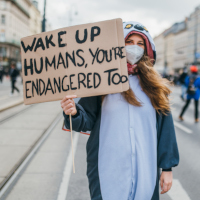
Widespread Youth Anxiety About Climate
View the page for this story
A recent study led by the University of Bath found that three-quarters of young people surveyed believe the future is frightening because of climate change and 65% agreed with the statement that governments are failing young people. Lise Van Susteren is a general and forensic psychiatrist and a co-author of the study and joined Living on Earth's Bobby Bascomb to discuss what young people are expressing about their eco-anxiety and how parents can safely talk to their kids about climate. (15:51)
Show Credits and Funders
Show Transcript
210924 Transcript
HOST: Steve Curwood
GUESTS: Kert Davies, James Gustave (Gus) Speth, Lise Van Susteren
REPORTERS: Peter Dykstra, Michael Stein
[THEME]
CURWOOD: From PRX – this is Living On Earth.
[THEME]
CURWOOD: I’m Steve Curwood.
The US government has known about the existential threat of climate change for decades but has done little to address it.
SPETH: I think we've run a forty-year experiment on whether we can rely on the federal government to rise to the occasion on this climate issue, and we know the results to that experiment are that they can't and they won't.
CURWOOD: Also, how inaction on climate change is damaging the mental health of today’s youth.
VAN SUSTEREN: We found that two thirds of the kids surveyed said that they were sad, afraid, and anxious. And over half reported a feeling, a sense of powerlessness, helplessness, even guilt and shame. Some children look at what’s happening in the world and they think they should be doing more.
CURWOOD: We’ll have those stories and more this week on Living on Earth—stick around!
[NEWSBREAK MUSIC: Boards Of Canada “Zoetrope” from “In A Beautiful Place Out In The Country” (Warp Records 2000)]
[THEME]
Big Oil Under Fire for Climate Disinformation
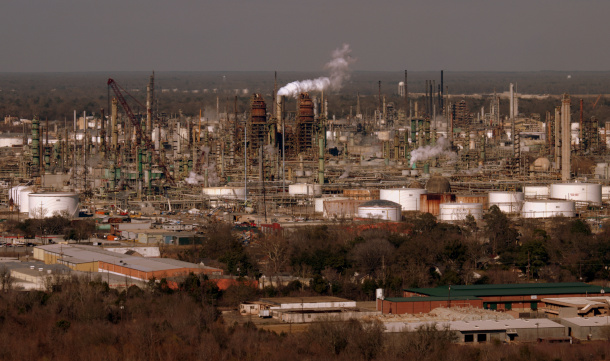
An Exxon oil refinery in Baton Rogue, Louisiana. Exxon, BP, Shell, and Chevron are the four fossil fuel companies that have been called to testify in front of the House Oversight committee. (Photo: Jim Bowen, Flickr, CC BY 2.0)
CURWOOD: From PRX and the Jennifer and Ted Stanley studios at the University of Massachusetts Boston, this is Living on Earth. I’m Steve Curwood.
The US House Oversight and Reform Committee is investigating the role of industry in the spread of disinformation about fossil fuel and its role in the climate crisis. Committee chair Carolyn Maloney of New York and environment subcommittee chair Ro Khanna of California note that Exxon, BP, Shell and Chevron have amassed close to $2 trillion in profits over the last 3 decades. In letters summoning those companies to testify on October 28th the chairs allege “to protect those profits” the oil giants “led a coordinated effort to mislead the public and prevent crucial action to address climate change.” Also called before the committee are fossil fuel lobbyists the American Petroleum Institute and the US Chamber of Commerce. Here to tell us more is Kert Davies, founder and director of the Climate Investigations Center. Kert, welcome back to Living on Earth.
DAVIES: Great to be here, Steve.
CURWOOD: So Kert, if you don't mind speculating for us for a moment, what lines of questioning do you see being brought up during these hearings?
DAVIES: I think the key thing that the congressional committee is going to go for is what these companies have known for years about climate change, how they deployed this massive disinformation effort to obstruct government efforts, and then how that aligns with how the companies are lobbying these days on different things around climate action.
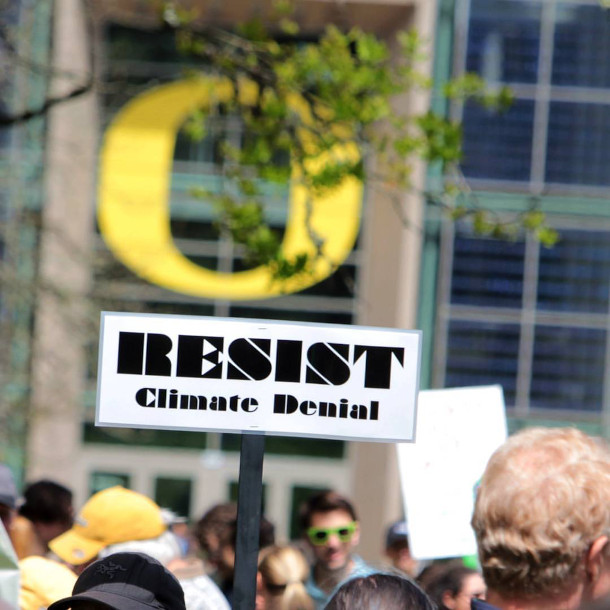
Four major oil companies and two lobbyist groups have been called to testify before the House Oversight and Reform Committee in October of 2021. (Photo: David Geitgey Sierralupe, Flickr, CC BY 2.0)
CURWOOD: So, you have done a lot of investigations into what some of these companies have done in the past. Tell me about some things that you discover that maybe haven't been talked about so much in the public so far?
DAVIES: Well, you know, we know an awful lot now, due to the great work of journalists and, and other investigators, academics, we spent a lot of time in archives ourselves. We know a lot about what the companies knew in the 80s and into the 90s. We know about how they deployed campaigns through things like the Global Climate Coalition, this industry effort that held the Clinton administration at bay. And we have some really amazing documents that have been uncovered by, specifically by journalists. Like from Shell, we have a document that was written in 1998, internal document where they were looking at their own future and really their own social license. And they did a scenario where they said, here's what might happen. In 2010, massive storms hit the East Coast, following the storms, this I'm quoting, following the storms, a coalition of environmental NGOs brings a class action lawsuit against the US government and fossil fuel companies, on the grounds of neglecting what scientists, including their own have been saying for years that something must be done. So there, they kind of predicted their own fate, they predicted that they would be called to account for this at some point and that what their own scientists knew really did matter. Now, with Shell, we know, for example, that back in the 80s, Shell had an internal assessment of the greenhouse effect. The cover says confidential on it. And in that report, they talk about climate change. They talk about their role, they talk about their own emissions being part of the problem, and they state quote, however, by the time the global warming becomes detectable, it could be too late to take effective countermeasures to reduce the effects or even stabilize the situation. This is 1988, 30 some years ago, and here we are now. We are having trouble stabilizing the situation, and finding effective countermeasures is becoming increasingly difficult.
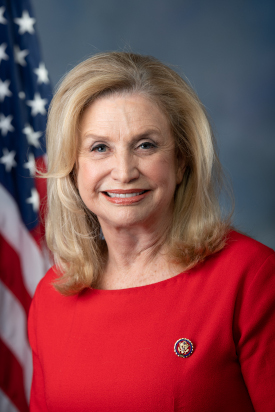
Carolyn Maloney (NY-12) is the Chair of the House Oversight Committee. (Photo: U.S. House Office of Photography, House Creative Services, Wikimedia Commons, Public Domain)
CURWOOD: There are Democrats and Republicans on the House Oversight Committee, which Democrats do you think will be prominent in pushing forward with this probe and which Republicans might also fall in that category?
DAVIES: Well, Carolyn Maloney, who's the chairwoman of the overall committee is very set on doing something about this, is very involved in setting up this hearing. The other people who have been involved heavily in are expected to contribute are Ro Khanna from California, Jamie Raskin from Maryland, who we all got to know this winter, is heavily involved. Down the lineup, AOC and Rashida Tlaib are on the committee and Katie Porter of California. So, a lot of really interesting, good prosecutorial minds are in this room. And you know, the republicans will come forward and probably defend big oil's legacy and say all sorts of nonsense, but we've got a lot of people on this committee, and it is going to be a full committee hearing. So, it's, it's sort of within the investigations part, but it's now going to be a full committee hearing. So, it'll be very interesting. And, you know, senior statesman, Eleanor Norton is also on the committee. So it'll be great. I mean, they have talent, depth, and some really good chops are among this team.
CURWOOD: And Kert, to be clear, because the whole committee is conducting this. The Chair, who holds the power of subpoena for depositions or testimony, is going to be right in it. It's not like they're going to be, the investigators are going to have to keep running to the main committee to get permission to subpoena people. She will, in fact, be chairing it, and having the power to compel people to testify.
DAVIES: That is correct. It's a full committee fully endorsed by Carolyn Maloney of New York, and they have been given powers to fight this. So it's really, it's really great. It's a landmark event.
CURWOOD: Now, several major oil companies, I believe, Exxon, BP, Shell, along with some of their outspoken supporters in Washington, such as the American Petroleum Institute, the US Chamber of Commerce. They say that they look forward to these hearings, and that they support a transition to a low carbon or net-zero future. What do you make of those statements?
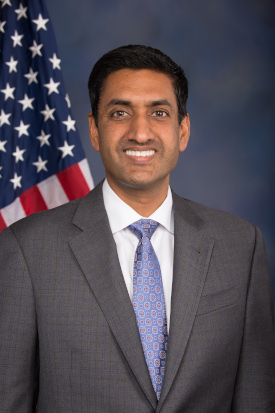
Ro Khanna (CA-17) is the Chair of the US House Committee on Oversight and Reform’s Subcommittee on Environment. (Photo: Eric Connolly, U.S. Congress, Wikimedia Commons, Public Domain)
DAVIES: Well, that's what they say. And that's what their advertising says and that's what they are projecting: that they are thoughtful companies that have cared deeply about this forever. We know the truth is different. We know that they have obstructed policy on climate change for decades. And we know this through their own internal documents. And we know this through the outward pressure that they've applied. Even right now they're trying to kill some of the bits that are in the Build Back Better plan. So they're not to be trusted. One of the best outcomes of this hearing is that the oil companies and their trade associations will get more scrutiny and will be kept out of the room in deciding how we deal with this policy. But, you know, what we have to avoid is this hearing, turning into a PR opportunity for the companies and letting them talk about their net zero commitments and all this happy talk that really doesn't amount to a hill of beans when you look at the numbers.
CURWOOD: So, what are some of the likely outcomes from this investigation? For a moment, let's look ahead and say that, indeed, the committee feels pretty strongly that there has been wrongdoing here. What powers does it have to make referrals to agencies that have enforcement teeth? Because of course, only Congress can pass laws. I mean, I'm thinking of the Department of Justice, which could perhaps have criminal or civil issues, the Federal Trade Commission, the Federal Energy Regulatory Commission, the Securities and Exchange Commission. What's the exposure of these companies should this House investigation find a lot of substance to what they're alleging at the outset?
DAVIES: Well, those are all great ideas. And I think anything's possible. I mean, I think people have talked about how, how many ways this should be investigated from a taxation point of view from the way companies have to report risk. You know, there's so many possible new regulations that could emerge or new branches of regulatory oversight. I don't think we know, and I don't think the committee is pre-determining that. I think they are looking at the evidence now. And they're trying to gather and explore what they can find out. And I think the solutions, or the the outcomes are to be determined, and are literally infinite at this point.

Kert Davies is the founder and director of Climate Investigations Center. (Photo: Courtesy of the Climate Investigations Center)
CURWOOD: Let's talk about what could be a very big case, if this committee finds a lot of evidence that the companies in fact, deceived the public and provided false data to the government regulators and all that. Some might suggest, just this year alone, the federal government has had to spend billions through the Federal Emergency Management Agency to deal with the storms, the fires, the drought, that could/should the federal government be suing these companies to get that money back on behalf of taxpayers?
DAVIES: Well, that's another interesting idea. And it is that big, right? You have a crime here that, you know, small c or large C crime, that has inflicted harm on all of us and is now inflicting costs on all of us. And the insurance companies are saying we can't handle this, you know, paying out these billion dollars impacts for much longer. So where they go with the remedy, you know, this is not a court hearing. This is not a lawsuit. This is an investigation by Congress, what remedies they have are different than would be achieved in a court type setting. But it is absolutely true that the costs are mounting. Everybody's feeling it. People's homes are being washed down the rivers, roofs are being blown off of hospitals, forests are burning up entire towns. We're in a major crisis, and it's coming home to people across this country. And I think frankly, the best thing to come out of this hearing is people need to know who to blame when these things happen. And they need to know that we have been victims of a massive campaign of deception, spanning a generation, that has left us behind on solving the climate crisis.
CURWOOD: Kert Davies is the founder and director of the Climate Investigation Center. Kert, thanks so much for taking the time with us today.
DAVIES: I really appreciate it. Thank you.
Related links:
- Reuters | “U.S. House Panel to Probe Oil Companies Over Climate Disinformation”
- CNN | “Lawmakers Launch Investigation Into Climate Crisis Disinformation by Fossil Fuel Industry”
- More on Kert Davies and the Climate Investigations Center
[MUSIC: Edgar Meyer, Cello Suite No. 1 in G Major, BWV 1007: I. Prélude, on Bach: Unaccompanied Cello Suites Performed on Double Bass by Johann Sebastian Bach, Sony Classical]
Beyond the Headlines
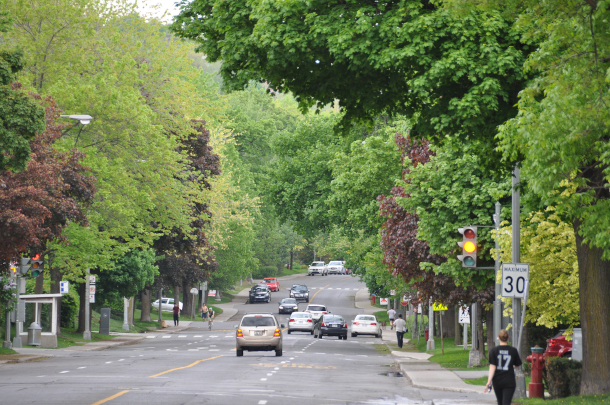
A tree-lined street in Westmount, an upscale neighborhood in Montréal, Québec. (Photo: abdallahh, Flickr, CC BY 2.0)
CURWOOD: It's time now for us to take a look beyond the headlines with Peter Dykstra. Peter's an editor with Environmental Health News, that's EHN dot org, and Dailyclimate.org. He's on the line now from Atlanta, Georgia. Hi there, Peter, what you got for us today?
DYKSTRA: Hi, Steve. As we all know, from that old saying, "money doesn't grow on trees." But in many cities, according to an analysis by CBC, Canadian Broadcasting, trees tend to grow near money. Several Montreal 'hoods with median household incomes of 100,000 Canadian dollars or more, with tree cover more than double some of the less affluent neighborhoods in that beautiful city. Other Canadian cities including Toronto and Quebec City showed the same thing.
CURWOOD: Well, and this puts real numbers on something that a lot of us suspect, that leafier neighborhoods tend to be richer. I'm thinking of places like Buckhead in your town, Atlanta, or Central Park in New York City, where the prices are much higher closer to the park.
DYKSTRA: Trees raise the rent and the real estate.
CURWOOD: There you go.
DYKSTRA: You know, my next item has a lot to do with trees as well, specifically burning trees in Australia, where they had record wildfires two years ago in 2019. Those wildfires, according to a study published in the journal Nature, caused an algae bloom 2000 miles across, as big as Australia itself, but more than 2000 miles offshore from the closest land point and the closest wildfire in Australia.
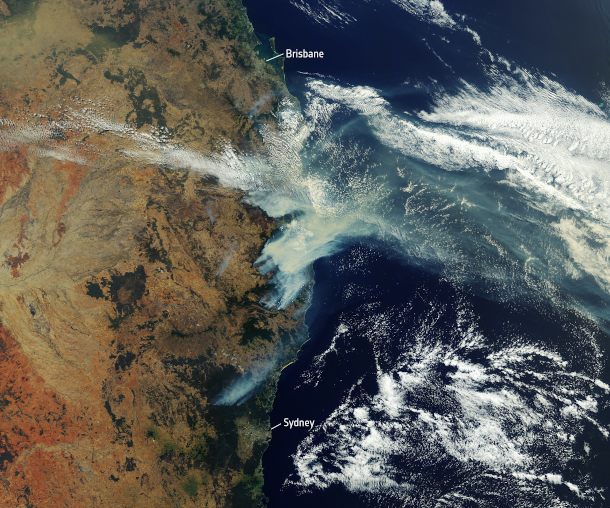
A satellite view of wildfire smoke from New South Wales and Queensland in Australia drifting out over the Pacific Ocean, November 2019. (Photo: Contains modified Copernicus Sentinel data (2019), processed by ESA, CC BY-SA 3.0 IGO)
CURWOOD: So usually you get algal blooms, when you get runoff from farms, too much fertilizer or certain factories, but obviously 2000 miles at sea, allowed them to point to the wildfires. And what was the mechanism?
DYKSTRA: Wildfire smoke contains all sorts of bad things other than just smoke getting in your lungs. One of those bad things is significant amounts of iron. And iron, of course, is a fertilizer that can help things grow in the ocean. The iron was carried away in wildfire smoke, it dumped in the ocean. It created this immense algae bloom all over the Southern Pacific. And it's a case of one environmental disaster causing a second one.
CURWOOD: It makes me wonder if we're going to see algal blooms in the eastern part of the United States after all these Western fires this year, or off the East coast.
DYKSTRA: That's right.
CURWOOD: Well, let's take a look now back in history and tell me what you want to talk about today.
DYKSTRA: Got another item from the beautiful city of Montreal. This was on September 28th, and there was a riot and a protest in Montreal, where French-speaking citizens viewed the imposition of a mandatory vaccination program as oppression by an English-speaking federal government. The thing is, the year was 1885 for this anti-vax protest, and the vaccination was to help eradicate smallpox.
CURWOOD: Why was there such protest about the vaccination then?

A drawing by Robert Harris titled “Incident of the smallpox epidemic, Montréal” shows sanitary police removing patients from the public through the use of force, around the time of the antivaccination riots of 1885. (Photo: Robert Harris, public domain)
DYKSTRA: Well, they stoned government offices, a home of a public health official in Montreal was torched. All because of fear of vaccines, not in the 21st century, but in the 19th century, when smallpox was the alleged means of repression.
CURWOOD: So that means that today's political pushback against vaccination is nothing new in human history, huh?
DYKSTRA: Nothing new at all. We keep thinking we invent new things. Instead, in cases like these, we're simply repeating the mistakes of past history.
CURWOOD: Well, thanks, Peter! Peter Dykstra is an editor with Environmental Health News, that's ehn.org, and dailyclimate.org. We'll talk again real soon.
DYKSTRA: All right, Steve. Thanks a lot, and I'll talk to you soon.
CURWOOD: And there's more on these stories on the Living on Earth web page. That's loe.org.
Related links:
- CBC | “In Cities, Money Doesn’t Grow On Trees, But Trees Grow Near Money”
- Vox | “Wildfires In Australia Caused An Explosion Of Sea Life Thousands Of Miles Away”
- Canadian Medical Association Journal | “When Antivaccine Sentiment Turned Violent: The Montréal Vaccine Riot Of 1885”
[MUSIC: Cindy Cashdollar, “Dobro Variations” on Cindy Cashdollar’s second video for Homespun, by Cindy Cashdollar]
CURWOOD: Coming up –Every US president since Jimmy Carter has known about the existential threat of climate change but nonetheless continued to help the fossil fuel industry. That’s just ahead on Living on Earth.
ANNOUNCER: Support for Living on Earth comes from Sailors for the Sea and Oceana. Helping boaters race clean, sail green and protect the seas they love. More information at sailorsforthesea.org.
[CUTAWAY MUSIC: The Two Man Gentlemen Band, “Andy Bean’s Bounce” on !Dos Amigos Una Fiesta!, by Andy Bean, Serious Business Records]
“They Knew”: The Feds’ 50-Year Climate Failure
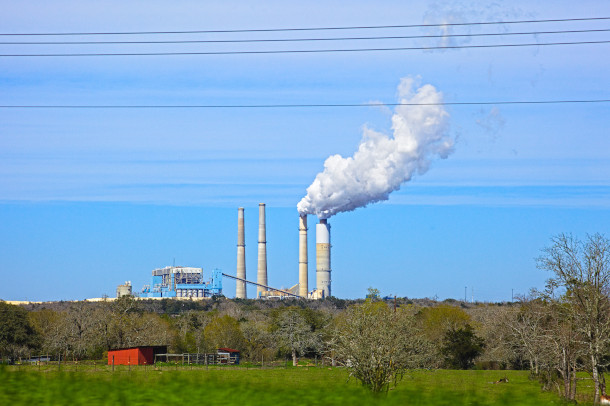
Fayette Power Project, a coal power plant in La Grange, TX 2019. (Photo by Sam LaRussa on Unsplash)
CURWOOD: It’s Living on Earth, I’m Steve Curwood.
The United States Government has known about the catastrophic dangers of climate change for some 50 years. It knew that continuing to emit greenhouse gasses would pose an existential threat to life as we know it, causing sea level rise, drought, fire and more. Yet it did little to actually tackle the problem and continues to spend billions to subsidize the fossil fuel industry. James Gustave Speth is a lawyer who led the White House Council on Environmental Quality back in the Carter Administration. He also spent a decade running the United Nations Development Program another decade as dean of Yale’s School of the Environment, and most recently joined the faculty of Vermont Law school, now a pro bono advisor to the legal team behind Juliana v US which alleges the federal government is failing to protect the rights of young people to have a livable planet. From that work he has written the book They Knew: The US Federal Government’s Fifty-Year Role in Causing the Climate Crisis. And he joins us now to share his wisdom from those years. Gus Speth, welcome to Living on Earth!
SPETH: Hello, Steve, it's been a while since we've talked together, and I'm delighted to be back with you.
CURWOOD: Gus, going back to look at fifty years, the federal government has not been doing what it ought to have on the question of climate disruption. Tell me how you got involved. As I understand, back during the Carter administration, you were chairing the President's Council of Environmental Quality?
SPETH: Yes, that seems like a long time ago. But they, when they needed a history of federal malfeasance, really, on the climate issue, in this lawsuit, they asked me to write the Carter administration up because it was a pivotal point when it was really the first time that the climate issue moved into the high levels of government in the White House. And I did, I wrote up the Carter administration. I thought I did a pretty good job, and I said, well, that was just four years; I'm done with that. And then they said, oh, by the way, would you do all the other administration's too, and I did a double take. But fortunately, this wonderful advocacy for children, Our Children's Trust, they had done an immense amount of documentary research. So I had all that at my disposal, so to speak, to work with in writing up what became, now, the book.
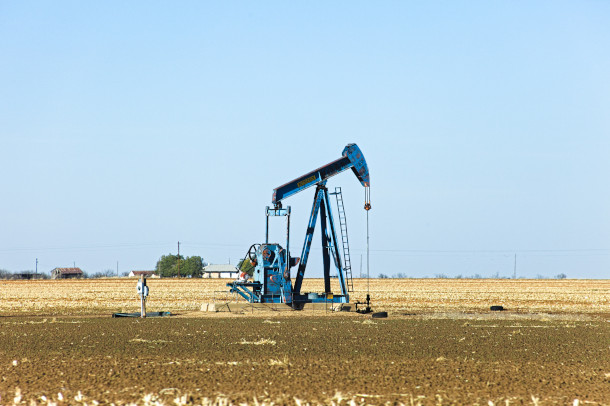
A pump jack used to extract crude oil from a well in Texas, 2019. (Photo by Sam LaRussa on Unsplash)
CURWOOD: So, what did the Carter administration understand about climate disruption then? And what did they do? And what did they fail to do?
SPETH: Well, this is a key part of the book I think, Steve, because people don't appreciate how much was known over forty years ago, about the climate issue, and how much was understood about the need for action. In the very beginning of the Carter administration, the President's Science Advisor, Frank Press, wrote a substantial memo to President Carter copied to the Jim Schlesinger, who was going to become the new Secretary of Energy, outlining the seriousness of the climate threat. And explaining it, the science of it, and basically said that we're going to have to do something about this issue. That it’s not a pressing urgency right now, but basically, it will be.
CURWOOD: At one point in your book, you point out that the scientific estimates of what the effect of adding all this carbon dioxide in the atmosphere would do pretty much tally up with what we're seeing, now, in 2021. To a remarkable degree.
SPETH: Yes, you know, it was predicted that we were going to see sea level rise, floods, droughts, heat waves, you know, fires and other things that were going to follow loss of species and human health impacts. And partly as a result of that, actions were taken in the Carter administration that I think, you know, set us on the right path. And he said repeatedly that the future of our energy in this country is going to renewable sources of energy.
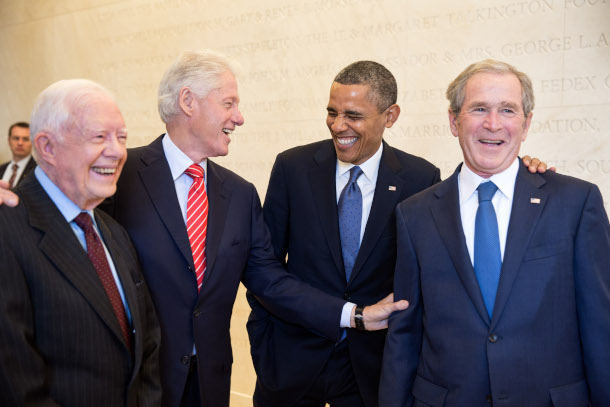
Former US Presidents Carter, Clinton, Obama, and George W. Bush. (Photo: Obama White House Archived, Flickr, Public Domain)
CURWOOD: Yeah, but what about Carter's call for synfuels, using coal instead of oil? I mean, coal has a lot more carbon per unit of energy in it than oil does. It's the worst offender now here on the planet. And President Carter's call for that sent a basic signal that he wasn't interested in having such a fundamental change in our energy structure, that there would be room for going renewable, or maybe I'm not reading that correctly.
SPETH: Well, you're certainly reading it correctly, that he called for a major synfuels program, and it increased coal use as a result of his administration. But he also knew that we had to shift over time to renewables. And he began promoting that, including famously that putting the solar collectors on the White House. So this was not a perfect situation, but it was a lot better than what followed, for example, because in comes Ronald Reagan, and takes a blowtorch to, you know, so many of the things that Carter was seeking to do.
CURWOOD: Yes. So there's the story that President Reagan, what took the solar panels off the White House? What else did he do to push back against the more renewable future that Jimmy Carter had envisioned?
SPETH: Well, just to take one set of examples having to do with renewable energy, yes, he did take the solar installations off of the White House symbolically, you know. More practically, he gutted the Carter solar programs that Carter had put in place, and abandoned the goal that Carter had set for the country of having 20% renewable energy by the year 2000. So you know, twenty years down the road, at that point, and we could have gone to 20% renewables, but we didn't. And I hope the book puts to rest, for at least those who have access to it. The idea that there's been so much uncertainty about the climate issue we didn't know, now we've finally discovered that it's real. That's really nonsense. We knew that it was real a long long time ago, and the science has been consistent in this period.
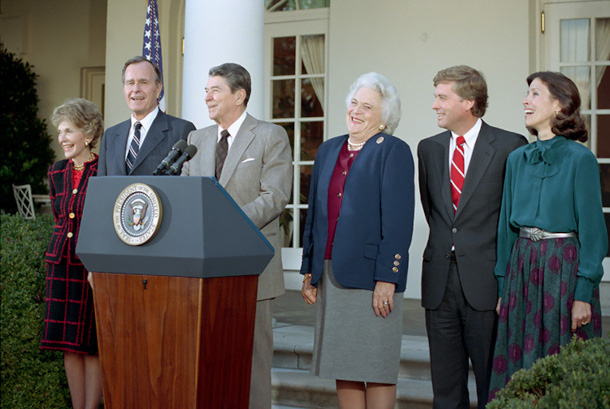
President Reagan speaking in the Rose Garden in November of 1988 with newly elected President-elect H.W. Bush. (Photo: Courtesy of the Reagan Library Public Photo Archives # C50354-14)
CURWOOD: And talking about the US Federal Government's fifty-year role in causing the climate crisis, you tend to cite the Democrats as having promise, but not necessarily having performance. You give less credit to the Republicans. But really, it seems like it's a bipartisan effort has been done here to really not have substantive action that responds to the scale of the crisis that the climate presents to us. Why do you think that is? Why is it that neither Democratic administrations or Republican administrations have moved forward to really have a net gain on dealing with the climate crisis?
SPETH: Well, for starters, I think we've run a forty-year experiment on whether we can rely on the federal government to rise to the occasion on this climate issue. And we know the results of that experiment. And that is that they can't and won't. I would say that it'd be a mistake to think that every party had sort of failed, that the parties had failed equally, in every administration. The truth is that we've had three administrations that have wanted to do something about the issue, and indeed have taken steps to deal with the issue. Those administrations are, you know, Carter and Clinton and Obama. And in each case, they were followed by a flame thrower administration, that happened to be a Republican administration. And the flame throwers sought to burnout, any of the stuff that the prior administration had been undertaking.
CURWOOD: So President Obama came into office with great promise and strong rhetoric. But at the end of the day, you write that his call for an all of the above energy strategy, essentially undermine virtually all the progress that he would have had with his other plans to deal with the climate. So even Barack Obama, who said many of the right things about the climate, history will see as a failure to deal with it.
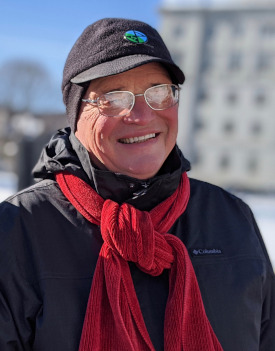
Gus Speth, the author of They Knew: The Government’s Fifty-Year Role in Causing the Climate Crisis. (Photo: Courtesy of MIT Press)
SPETH: Well, they've all been failures to deal with it. And that includes Obama, and every other administration. And that is a sad commentary, but it's the conclusion that I reluctantly came to in writing the book. They were all of the above, when it came to energy policy. At best they said, then promoted good things about renewables and efficiency. But at the same time, they were very proud of their accomplishments in moving fossil fuels forward. And in Obama's case, in promoting fracking and US exports of fossil fuels. So this has been a repeated pattern.
CURWOOD: As I understand it, there's some, what, $120 billion a year right now in federal subsidies to the fossil fuel business, which is more than we spend on things like, say, public education. To what extent is President Biden calling for the elimination of those subsidies in this budget reconciliation bill?
SPETH: Well, one of the mysteries, of course, is to know exactly what is inside this legislation. And I don't pretend to be an expert on all of that. But I have certainly seen and read that the fossil fuel subsidies continue in this reconciliation package, which is, you know, one of the disturbing things about it. There are a lot of good things in there. And the big good thing, is the plan to incentivize our electric utilities to shift to renewable power quickly. And are they going to get through? I certainly don't know, Senator Manchin, who has his key role in this process as a Chairman of the Energy Committee in the Senate, and also someone who positioned in many ways between the two parties, you know, and but it turns out is heavily invested and personally in the coal industry in West Virginia. And we don't know what the Senate as a whole is going to do. But I will just say this, that there has never been a more hopeful moment. But a moment, that's more fraught with the possibility of failure. And the implications of failure are profoundly negative for dealing with this issue. So here we are.
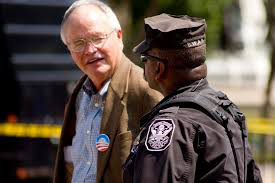
Gus Speth getting arrested at a Keystone XL protest at the White House. (Photo: Courtesy of James Gustave Speth)
CURWOOD: You did all this research, Gus Speth, for the lawsuit, Juliana versus the US, the Children's Trust lawsuit, to compel the government to protect future generations from this now exploding risk of climate disruption. Talk to me about that lawsuit.
SPETH: The goal of the lawsuit is to compel federal action that would sustain the climate for today's young people and for future generations. It seeks to do that through an innovative constitutional principle, which says that when the federal government acts affirmatively to endanger a group of people like young people, that that creates on it, a responsibility to rectify that injury. There are two big things that have not happened on the climate issue that could make a huge difference now. One is a massive civic mobilization, an unprecedented outpouring of people, of demonstrations, of protests, but they get attention. And we've had incidents before, or marches before, but we haven't had anything like this sustained pressure on the system that the public now needs to bring. The other thing that could be new in the picture, is this judicial intervention.
CURWOOD: Your prescription for solving the problem of government inaction on climate change, sounds a bit like their response to at least some elements of institutional racism, going back a couple generations now, in other words, a lot of marching and protests and sit-ins and demos. And that ultimately, the courts spoke up, and began to chip away at our system of institutional racism, which, of course, sadly, is not completely gone today, but certainly very different than what it was back in the day when, when Jim Crow reigned. What kind of parallels might you see there?
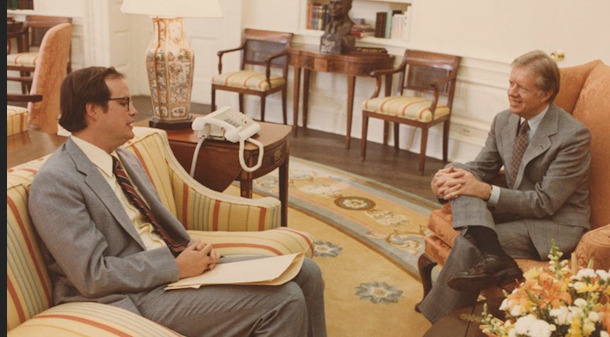
Gus Speth with Jimmy Carter in the Oval Office, 1980. (Photo: Courtesy of James Gustave Speth)
SPETH: Well, you know, Steve, it’s fascinating to be looking back on it. First, the Civil Rights Movement, and more recently, the Black Lives Matter, that have pushed that, you know, early civil rights into a new phase, we in the environmental area, have been inspired by that. When I helped to start the Natural Resources Defense Council in the late 1960s, we were inspired by the Civil Rights Movement. And we wanted to follow what the NAACP Legal Defense Fund had done by creating a public interest law firm for environmental issues. And now I think what is going on in the Black Lives Matter, and other areas of progress, that this is a diffusion of these issues in the environmental justice and the climate justice concern of bringing them together? This is all very, very hopeful and very inspiring. The sad part looking back on it, is it having been inspired by the Civil Rights Movement, we in our environmental work, didn't really involve, you know, the black community or, or minority communities. And it was only later when Bob Bullard and others have, you know, found so much discrimination in environmental programs. You know, we began to be aware of these linkages, which are now, I hope, part of all the environmental work, but it's still a work in process, as you say.
CURWOOD: We have a long way to go, and at the international level, we see this divide between the global north and global south along economic and racial lines, even when it comes to dealing with the climate and such. Gus, how can we be hopeful if we’ve seen time after time, governments talk about these issues, but at the end of the day, do what the fossil fuel industry wants, and the actions don't add up to being sufficient? What's to be done?
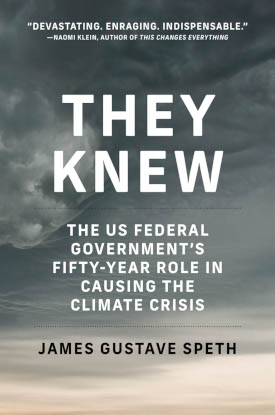
Gus Speth turned his expert analysis for Juliana v. The United States into the book They Knew. (Photo: Courtesy of MIT Press)
SPETH: Well, I hope the book will help with that because a couple of the lessons of the book as what we've been doing isn't working very well. Another lesson is that science alone is not going to carry the day, that the comfortable advocacy that we've been engaging in, myself included, is not going to carry the day. So, I think we need a real outburst. A real rising up of the public. We need everybody out raising hell on this issue. And I hope the book will contribute to this sense of outrage because you can't read how many opportunities we had to deal with this issue and how many we failed to deal with. If we had that plus a powerful judicial intervention into this process, we would have some hope and that you asked about my hope and that is my hope. The basis for hope now.
CURWOOD: James Gustave Speth's book is called, “They Knew: The US Federal Government's Fifty-Year Role in Causing the Climate Crisis.” Gus, thanks so much for taking the time with us today.
SPETH: My pleasure, Steve, it’s good to see you.
Related links:
- Find the book “They Knew: The U.S. Federal Government's Fifty-Year Role in Causing the Climate Crisis" (Affiliate link helps donate to LOE and local indie bookstores)
- Read about Our Children’s Trust and the lawsuit Juliana v. The United States
[MUSIC: Playing For Change Ensemble, “One Love” on Songs From Around the World, by Bob Marley, Playing For Change and Hear Music]
CURWOOD: Coming up – How fifty years of inaction on climate change is causing mental health problems in today’s youth. That’s just ahead on Living on Earth.
ANNOUNCER: Funding for Living on Earth comes from you, our listeners, and United Technologies, combining passion for science with engineering to create solutions designed for sustainability in aerospace, building industries, and food refrigeration.
[CUTAWAY MUSIC: Dan Sullivan, “Wave” on Cape Cod Magic, by Carlos Jobim, Dan Sullivan Music]
BirdNote®: Dove or Pigeon?

Eurasian collared dove (Photo: Doug Greenberg, CC)
CURWOOD: It’s Living on Earth, I’m Steve Curwood.
[BIRDNOTE THEME]
CURWOOD: Shakespeare famously asked, “What’s in a name? That which we call a rose. By any other name would smell as sweet.” In this week’s Bird Note Michael Stein poses a similar question.
BirdNote®
Dove or Pigeon?
“Dove” and “pigeon” may bring different images to mind. Doves seem elegant, bringers of peace.
[Mourning Dove song, ML 22930 W. Fish)
Pigeons, particularly the rowdy flocks of city birds, may seem… less appealing.
[Rock Pigeon wing flaps, https://www.xeno-canto.org/611438]
But despite these associations, there is no formal distinction between doves and pigeons, only a linguistic one. The word “pigeon” came into the English language from French, while “dove” came from Nordic languages. In many languages, the birds are one and the same.
And the family is a lot bigger and more diverse than just the common North American varieties: there are 308 species of doves and pigeons, including some of the most beautiful and colorful birds in the world.
[Victoria Crowned-Pigeon https://www.youtube.com/watch?v=u5QTnNqngFg]
The silver and purple Victoria Crowned-Pigeon of New Guinea is the world’s largest, nearly two and a half feet long. At the small end are several species of ground-doves of the American tropics, measuring six inches — not much bigger than a sparrow — and ranging from bright cinnamon-brown to dark blue.
[ground dove/Inca Dove sp. https://macaulaylibrary.org/asset/140228#_ga=2.98992920.784469730.16164…]
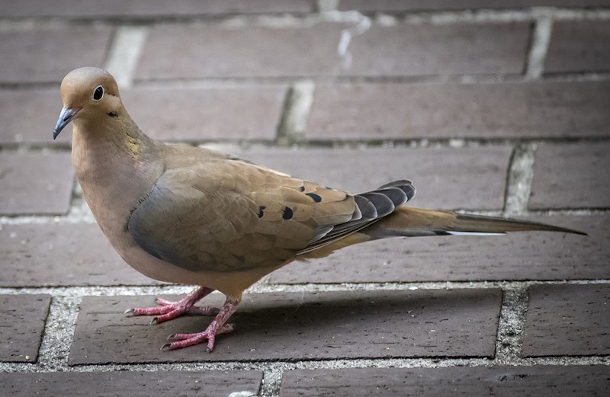
A mourning dove (Photo: Trish Hartmann, CC)
Call them what you like — they are a fabulous group of birds.
###
Written by Bob Sundstrom
Senior Producer: John Kessler
Production Manager: Allison Wilson
Producer: Mark Bramhill
Associate Producer: Ellen Blackstone
Digital Producer: Conor Gearin
Bird sounds provided by The Macaulay Library of Natural Sounds at the Cornell Lab of Ornithology, Ithaca, New York. Rock Pigeon Xeno Canto 611438 recorded by U. Paal, and ground dove/Inca Dove sp. ML 140228 recorded by G. Vyn., Mourning Dove ML22930 recorded by W. Fish
BirdNote’s theme was composed and played by Nancy Rumbel and John Kessler.
© 2021 BirdNote July 2021 Narrator: Michael Stein
ID# dove-pigeon-01-2021-07-06 dove-pigeon-01
Reference:
https://www.mentalfloss.com/article/554182/what-is-difference-between-p…
https://www.birdnote.org/listen/shows/dove-or-pigeon
CURWOOD: For photos fly on over to the Living on Earth website, loe dot org.
Related links:
- Find this story and more on the BirdNote® website
- The Spruce | “Beautiful Pictures of Pigeons And Doves”
- Learn more about the Rock Pigeon at All About Birds
Widespread Youth Anxiety About Climate
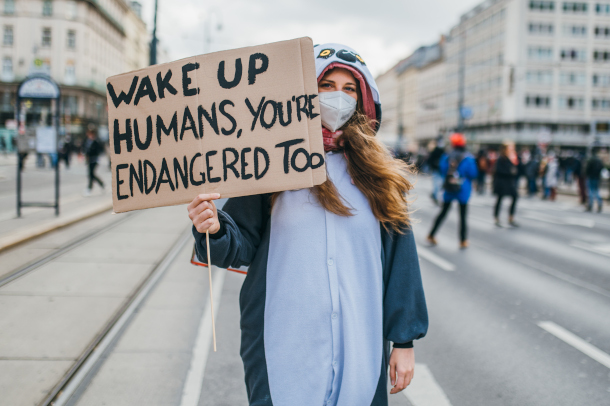
According to the global survey titled “Young People’s Voices on Climate Anxiety, Government Betrayal and Moral Injury: A Global Phenomenon” 60% of the young participants said that they felt ‘very worried’ or ‘extremely worried’ about the climate crisis. (Photo: Ivan Radic, Flickr, CC BY 2.0)
CURWOOD: A recent global survey illustrates the depth of anxiety many young people are feeling about climate change. The survey looked at 10,000 youth from the ages of 16 to 25 years from 10 countries: the UK, Finland, France, the US, Australia, Portugal, Brazil, India, the Philippines and Nigeria. The survey, led by the University of Bath, found that 75 percent of the young respondents believe the future is frightening because of climate change. Lise Van Susteren is a practicing general and forensic psychiatrist in Washington, DC. She is an expert on the physical and mental health effects of climate change, and a co-author of the study. She spoke with Living on Earth’s Bobby Bascomb.
BASCOMB: A central focus of this study is eco-anxiety. What did the young people who were surveyed have to say about their anxiety associated with climate change?
VAN SUSTEREN: Well, I have to say, it doesn't come as a huge surprise to me. I have been talking with kids now, for many years about their anxiety and I was the expert witness on the psychological damages to kids in the United States is referred to as the Juliana case, we sued the United States government for inaction on climate. So, all of the things that we found in the survey, you know, if we really use our common sense, we probably could come up with them. But people don't always connect the dots. So the fact that we have it now on paper and can wave it in the air is really important. So here's what we found, we found that two thirds of the kids surveyed said that they were sad, afraid and anxious. And over half reported feeling a sense of powerlessness, helplessness, even guilt and shame. And some people will say, what's the guilt and shame? Well, that's an important aspect, first of all, because some children look at what's happening in the world, and they think they should be doing more. Or they look at what's happening in the world and there's a sense that, are they really valued knowing what's that adults know what is being predicted and they're not taking action. There can even be a sense of shame that they're not valued to the extent that of course, they would ask to be, want to be and deserve to be. So that's a little snapshot of some of the sentiments that we found in the kit.
BASCOMB: Well, that makes sense. I mean, if governments and industry know what they're doing know that this is going to cause an unlivable planet, for this large cohort of people and yet do nothing, it sort of sends the message that you know what you're not important enough for us to care about and to really, you know, address this problem in a meaningful way.
VAN SUSTEREN: Bobby, the easiest way to think about this, and I often give this analogy is think of a family. A community, a region, and nation, a planet is like a family writ large. So think about what would happen in your family if your parents didn't take care of you, if they knew that you were hungry, or that you were walking home in a snowstorm, or you didn't have the proper clothing and things like that. We know what that would do for your self-esteem? Well, the planet is that family writ large. So anything that you can think about that would hurt you about a family letting you down, think about it in terms of what government inaction messages to young people.
What can parents do if their children experience climate anxiety?
— ParentsForFuture Global (@parents4futureG) September 14, 2021
First of all, listen and validate their emotions #WeFeelThisToo
With empathy, compassion and kindness parents can offer support so that the fear does not cloud your children's heart or dominate their actions. pic.twitter.com/VF0vOrYOD4
BASCOMB: And over half of the youth in this study reported a sense of doom that the future is literally doomed. Four in ten even said that they are hesitant to have children of their own as a result. That's really dark thinking for such a young age.
VAN SUSTEREN: It is unthinkable, you know, if a child or people adults don't want to have children, that's certainly a personal choice. But to have that decision forced on you how unnatural. And the reason kids don't want to have, or young people don't want to have or say they don't want to have children is twofold. One is that they first of all, they don't want to potentially bring a child into a world that they feel might be chaotic. Secondly, they count up the carbon emissions. And some of them will say to themselves, that they can't in good conscience add even more of a strain on the limited resources and the capacity of the planet to recover. So the added carbon emissions of having another child gives them pause.
BASCOMB: And I mean, governments should really be listening to that, because it's not good for your economy to have a sudden drop out and the demographics. Look at China, you know?
VAN SUSTEREN: Such an astute remark. Let's be realistic and that is that the benefits that older people seniors have, because of their long years of work, are in part paid for by a younger generation that continues to work, you know, we take care of each other all along the generational divide. And this is a point that's actually really important to me, and that is that there is a real generational injustice here on the part of people who have power who are older, and I've even called a generational aggression. When you know that you're hurting someone and you're doing it anyway, you know whether you like it or not, whether you accept it or not, whether you say so or not and whether you're conscious of it or not, it's still aggression. And I see this aggression in the attitude of some people not all, towards the younger generation that's going to have to deal with us.
BASCOMB: Yeah, I do hear, you know, there's sort of the sentiment of older people saying, well, you're overreacting, you're weak, you know, you don't, I don't know, you don't really understand the world. You know that you're overreacting to these things
VAN SUSTEREN: Oh that snowflake thing?
BASCOMB: There you go.
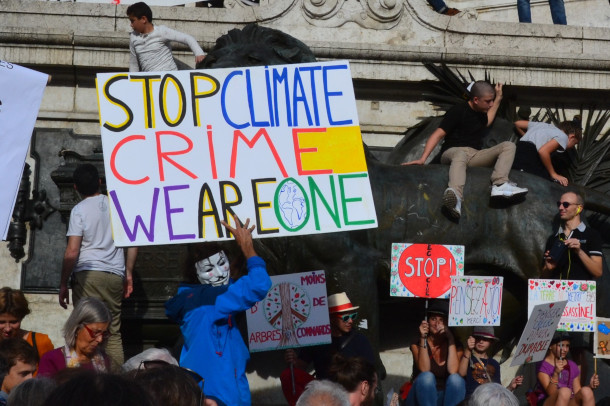
Tens of thousands of demonstrators marched through central Paris as well as other French towns on October 13, 2018 calling on the French government and the international community to do more to tackle climate change. This is one of many protests. (Photo: Jeanne Menjoulet, Flickr, CC BY 2.0)
VAN SUSTEREN: Boy, that really really nails me when I hear the baby boomers talking about this generation that is going to have so much to deal with. And I'm not saying that you can't build resilience. I'm not saying that you don't have a collaborative spirit. I'm not saying any of these things. But the idea that we should trash the place, it's sort of like, you know, it's a reverse sort of situation where parents go out of town and the teenagers trash the house. Well here we are with young people looking, waiting, and expecting a planet that's in good shape or at least as good as their parents got it and we've trashed it. And we have, and we're doing it consciously. Now, it's one thing when we didn't know and lots of people didn't know, we know now, we are being warned. We can see with our own eyes.
BASCOMB: Well what did the participants have to say specifically about government action on climate change?
VAN SUSTEREN: The realization is that while obviously corporations are not exempt, and adults generally are not exempt, the kids realize very, very well, that if you really want rapid social change, they know full well, that it's writing policies that protect them for the future, that will assure that we have responsible attitudes, in a sense in place. And by attitudes I mean corporate, I mean social, I mean other political, because after all, businesses need to have policies that they can follow that tell them these are the rules of the road, when they hear that they will make a changes very quickly. Kids are very savvy, they know full well, that government is the one that can unleash the power.
BASCOMB; Well, what do you see in this report in terms of the views from developed versus developing countries which are represented here by Nigeria, India, the Philippines, and you can make the argument Brazil?
VAN SUSTEREN: One of the things about developing countries versus an established country is that in developing country, first of all, the cross section of people, because we had to find kids that were able to get internet, that's number one, and they also had to be computer savvy, of course. So that limits your ability to get a real cross section, you could make the case that we're really speaking to elites, one could make that case. I don't know if we really dug down if you could make that accusation. And certainly, we're not going to spend a lot of money doing something like that. Because it just is very clear. And that is, kids who do have access to what's going on in the world, are very media savvy. So I think we can conclude that the future leaders of countries that are developing are very aware, and they will be the thought leaders, they will be the ones that are speaking out. And those are the ones that we clearly need to talk to us, you know, primarily given the fact that they will have future power.
BASCOMB: Well, you know, so many young people responded with a very, very high level of anxiety and concern about climate change. How does that affect a growing brain? So many of these people are still growing? I mean, does it connect the synapses in a way that's hardwiring them for future concerns?
VAN SUSTEREN: It so does, there is a psychological priming, so that when you have trauma, especially if kids have had repeated trauma and some of these kids have had repeated trauma, what happens is that you are more prone to trauma in the future. So that's the psychological underpinning. And then there's something else that is even more troubling to me and I sort of suck in air because you can't traumatize a generation and not think on many levels, that this isn't going to have an effect on future generations. So it's not only the traumatized people are more inclined to raise traumatized kids because of their own behavioral choices and their own moods and things like that. It's just inevitable but something that's even more sobering Bobby is that we know that there is something called transgenerational it's epigenetic transfer of stress, which means basically, that when you awaken DNA strip, in one generation to code really for stress, that code gets transmitted to the next generation. So it stays awake into the next generation, it doesn't reset and start over at zero. So what you have is the next generation experiencing the trauma of a previous generation. So just think about it in every single way, when you're traumatized. And, and let's just talk about, let me back it up a little, let me just say, how about stress? You know, I say to your listeners, how well do you do when you're stressed? Do you think well? Can you remember exactly conversations? Certainly, you've been stressed and known that you've gotten sick. So it affects your immune system, it reflects your memory, it reflects your judgment. We all know we don't make great decisions when we're under stress. Well, teenagers, young people all the more and as you suggested, for a growing brain, what happens is that you get this sort of neurologic foundation that serves you for the future and it is being altered when it's at its most plastic, as its most responsive. So that's, that's the danger that we face. And I don't want to say it's only bleak, because we don't want to suggest that kids have only a bleak outlook, and they're victims and all the rest. The world is waking up and we need to talk about that, too.
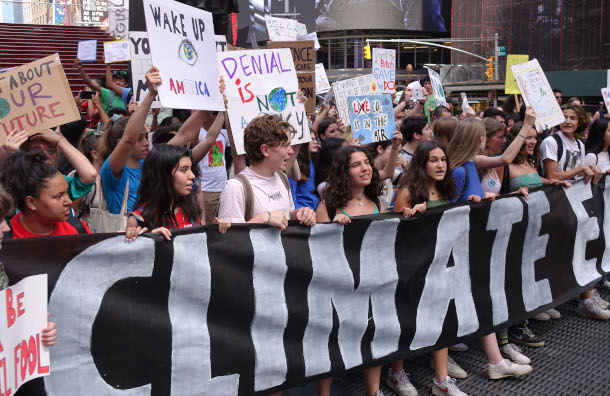
Participants from the global south expressed a high concern for the climate crisis with 92% from the Philippines describing the future as “frightening”. (Photo: Felton Davis, Flickr, CC BY 2.0)
BASCOMB: Yeah. Well, you are a practicing psychiatrist, what do you think is an appropriate age for parents to start having these types of conversations with their children? You know, I think most parents want their kids to have a carefree childhood, they don't want them worrying about the existential threat of climate change and, you know, causing this harm that we've been talking about. But at the same time, I mean, that's the reality of the world. And we need young people to care about it, you know, we need everyone together, you know, to push for action on this. How do you square that circle?
VAN SUSTEREN: So, so well said. And I get that question a lot. So I have my three L's as listen, learn and leverage. So it is never too early to encourage a child to respect life. And by life, it's all nature, and all animals and plants. They're all our brothers and sisters, we evolved from them, we know how much we share. So teaching kids to respect life, at the earliest of ages is critical, so that you can start before you ever say a word about climate. So what I've also learned is that it is really important to listen to kids. What are your kids saying? A lot of kids have heard stuff. And so you might say to them, you know, there's a lot of talk lately about the weather and if they have older siblings, they might have heard about it, ask them what they have heard. And, you know, sometimes I had a patient who has child thought, heard about extinction and thought that the family dog Charlie was going to die and hadn't said anything to the mom but was harboring this fear that Charlie was going to die. And it's why it's so important to hear about what your kids are thinking. So listen to what your kids are saying. Learn about what you need to know so that you can talk to them. And then you can say, and this is the leverage part, you can say to them, yes, and you are right, there has been a lot of this. Never lie to a kid. What you might do is disabuse them of some of the irrational thoughts that they have. But tell them you understand their fears. And then this is where you go to say, well, that's why in our family, and then talk about what you do to protect nature, or if they're old enough the climate, depending upon their age of course, how you respond is important. So that's why we turn out the lights, that's why we don't take a lot of or any plane trips, that's why we eat the kind of food we do, that's why we have a garden, etc. And if you haven't been doing those things this is the perfect opportunity to make your child feel important and say, you know what, based on what you've just said to me, and what I've heard about what you're thinking, our family is going to do more to make sure that the planet is safe for you. So you can use these conversations not only to steer them in the right direction, but to build their self-esteem and resilience, these are empowering words to a child who feels vulnerable.
BASCOMB: Dr. Lise Van Susteren is a practicing general and a psychiatrist in Washington, DC, an expert on the physical and mental health of climate change. Thank you so much Dr. Van Susteren for this chat and all of these great advice.
VAN SUSTEREN: Thank you.
CURWOOD: That’s Dr. Lise Van Susteren, speaking with Living on Earth’s Bobby Bascomb.
Related links:
- Watch a panel hosted by AVAAZ on how youth climate anxiety is linked to climate inaction
- Learn more about Dr. Lise Van Susteren’s work in studying the physical and mental health effects of climate change.
- Read the preprint in The Lancet here: "Young People’s Voices on Climate Anxiety, Government Betrayal and Moral Injury: A Global Phenomenon"
[MUSIC: Miles Davis “All Blues” on Kind Of Blue Sony Music]
CURWOOD: Living on Earth is produced by the World Media Foundation. Our crew includes Naomi Arenberg, Paloma Beltran, Jenni Doering, Jay Feinstein, Mark Seth Lender, Don Lyman, Aynsley O’Neill, Jake Rego, Genevieve Santilli, Teresa Shi, Gabriell Urton, and Jolanda Omari. We bid fond farewells to interns Anna Canny, Joshua Siracusa, and Tivara Tanudjaja. Thanks for your hard work! Tom Tiger engineered our show. Alison Lirish Dean composed our themes. You can hear us anytime at L-O-E dot org, Apple Podcasts and Google Podcasts, and like us, please, on our Facebook page - Living on Earth. We tweet from @livingonearth. And find us on Instagram at livingonearthradio. Steve Curwood is our executive producer. I’m Bobby Bascomb. Thanks for listening!
ANNOUNCER: Funding for Living on Earth comes from you, our listeners, and from the University of Massachusetts, Boston, in association with its School for the Environment, developing the next generation of environmental leaders. And from the Grantham Foundation for the protection of the environment, supporting strategic communications and collaboration in solving the world’s most pressing environmental problems.
ANNOUNCER 2: PRX.
Living on Earth wants to hear from you!
Living on Earth
62 Calef Highway, Suite 212
Lee, NH 03861
Telephone: 617-287-4121
E-mail: comments@loe.org
Newsletter [Click here]
Donate to Living on Earth!
Living on Earth is an independent media program and relies entirely on contributions from listeners and institutions supporting public service. Please donate now to preserve an independent environmental voice.
NewsletterLiving on Earth offers a weekly delivery of the show's rundown to your mailbox. Sign up for our newsletter today!
 Sailors For The Sea: Be the change you want to sea.
Sailors For The Sea: Be the change you want to sea.
 The Grantham Foundation for the Protection of the Environment: Committed to protecting and improving the health of the global environment.
The Grantham Foundation for the Protection of the Environment: Committed to protecting and improving the health of the global environment.
 Contribute to Living on Earth and receive, as our gift to you, an archival print of one of Mark Seth Lender's extraordinary wildlife photographs. Follow the link to see Mark's current collection of photographs.
Contribute to Living on Earth and receive, as our gift to you, an archival print of one of Mark Seth Lender's extraordinary wildlife photographs. Follow the link to see Mark's current collection of photographs.
 Buy a signed copy of Mark Seth Lender's book Smeagull the Seagull & support Living on Earth
Buy a signed copy of Mark Seth Lender's book Smeagull the Seagull & support Living on Earth

